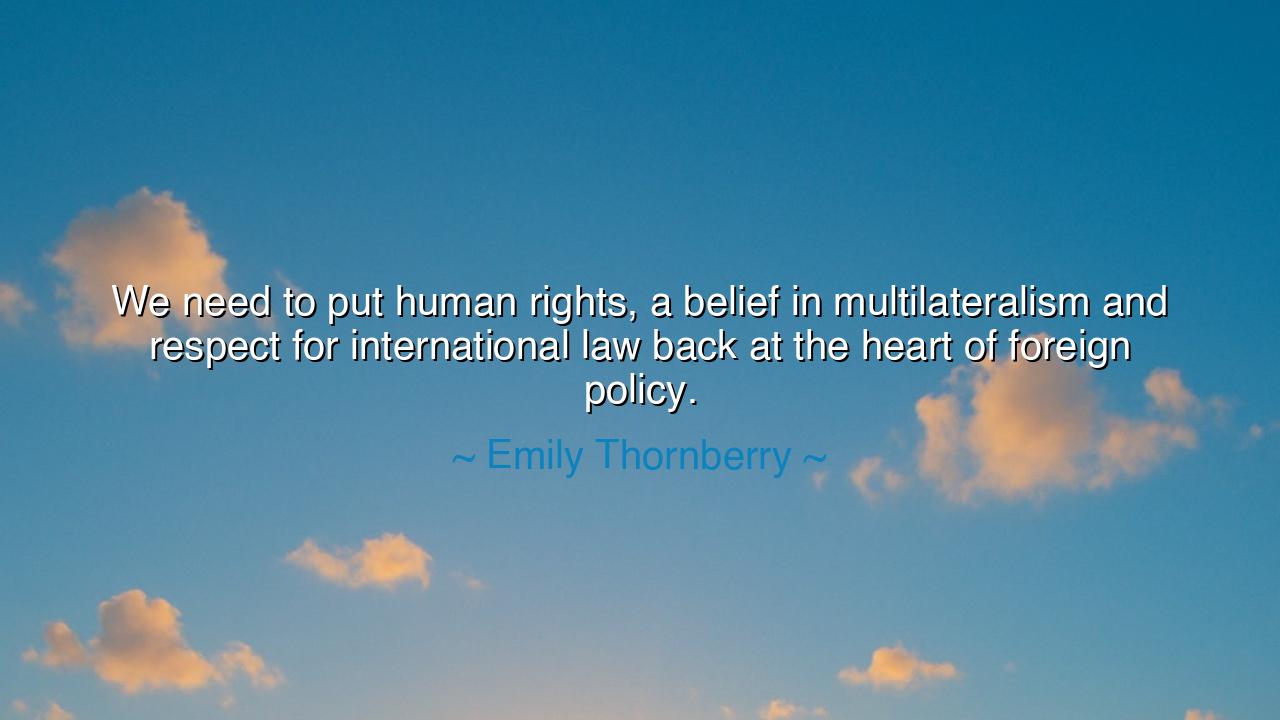
We need to put human rights, a belief in multilateralism and
We need to put human rights, a belief in multilateralism and respect for international law back at the heart of foreign policy.






The words of Emily Thornberry—“We need to put human rights, a belief in multilateralism and respect for international law back at the heart of foreign policy”—resound like a call from the watchtower of history. They summon us to remember that the dealings of nations must be guided not by greed or domination, but by justice, cooperation, and reverence for the dignity of all people. For when the affairs of states are severed from human rights, when they abandon law for raw power, the world becomes a battlefield of the strong against the weak, and civilization itself begins to unravel.
The ancients knew this truth, though they spoke in different tongues. Thucydides, chronicler of the Peloponnesian War, recorded how the Athenians told the Melians, “The strong do what they can, and the weak suffer what they must.” In this cold creed of power, we see the world without respect for law, without balance, without morality. Yet even then, philosophers like Plato and Aristotle dreamed of a higher order, where justice would govern both men and states. Thornberry’s words echo this ancient struggle: shall we build our world upon might, or upon right?
History offers us shining examples of the higher path. After the carnage of the Second World War, when tens of millions lay dead and cities lay in ashes, the nations of the world gathered to forge a new order. Out of grief and ruin came the United Nations, the Universal Declaration of Human Rights, and the body of international law that sought to bind nations to principles higher than conquest. This was the spirit of multilateralism—the belief that many voices joined together can secure peace more firmly than one voice shouting above the rest. For a time, humanity tasted the fruit of this vision: treaties to end war, aid to rebuild the fallen, and laws to hold tyrants accountable.
Yet the temptations of power are never silenced. Again and again, nations have strayed from this path, seeking dominance rather than cooperation, self-interest rather than shared destiny. Wars of aggression, secret prisons, economic coercion—all testify to what happens when foreign policy forgets the centrality of human rights and the restraints of law. Thornberry’s words rise as a warning: when nations betray these foundations, they sow discord that will one day return upon their own heads.
The deeper meaning of her call is that foreign policy is not a game of kings and ministers alone. It is the fate of ordinary people—the refugee fleeing bombardment, the child living under occupation, the worker caught in the tides of global strife. To place human rights at the heart of foreign dealings is to remember that behind every treaty and every border are human lives, sacred and irreplaceable. To embrace multilateralism is to affirm that no nation, however mighty, can alone solve the challenges of climate, poverty, and war. To uphold international law is to confess that even nations must bow before justice, just as citizens bow before law within their own borders.
The lesson for us is clear: as individuals and as nations, we must demand a politics rooted not in arrogance but in respect, not in domination but in cooperation. Let each citizen hold leaders accountable to these higher standards. Let each government measure its strength not by the size of its armies, but by the depth of its commitment to justice among nations. Let each of us remember that peace is not kept by weapons, but by trust, and trust is built by fidelity to promises, to treaties, and to truth.
Therefore, let Thornberry’s words be carried as a torch into our time: place human rights, multilateralism, and international law at the center of our dealings, and we may yet preserve peace in a fractured world. Abandon them, and we descend once more into the chaos from which our ancestors cried, “Never again.” The choice is before us, as it has been before every generation. Let us choose wisely, let us choose justly, and let us choose together.






AAdministratorAdministrator
Welcome, honored guests. Please leave a comment, we will respond soon